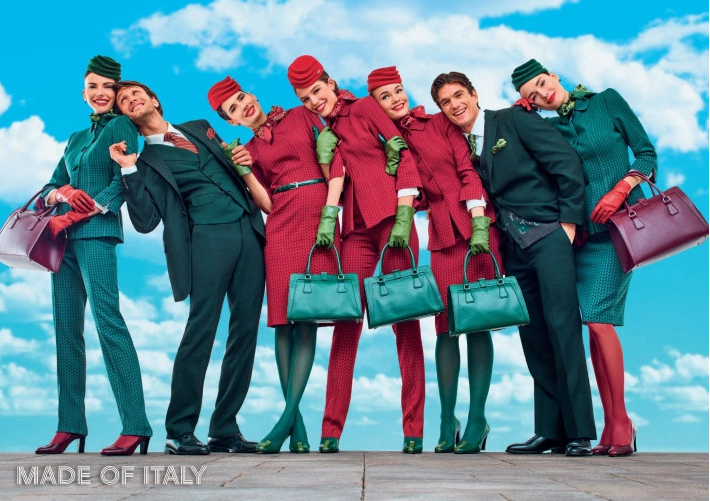The problem according to U.S. airlines is this–
The nations of Qatar and the United Arab Emirates (UAE) are funneling billions of dollars in government subsidies to their state-owned airlines, distorting the international aviation market and undermining fair competition.
Imagine a state-backed airline that runs between Milan and New York. It loses money each year, but is propped up by the government. Massive economic advantages to the preferred carrier give it undue access and market share.
That airline exists. It’s called Alitalia.
Alitalia lives in the Twilight Zone. It believes that by reducing costs by a billion dollars and eliminating 20 aircraft, it can increase revenue by 30% and return to profitably.
- €1 billion cost reductions by 2019
- Revenue to increase 30 per cent by 2019
- Profitability by 2019
- Fleet reduced by 20 narrow-body aircraft
- New competitive proposition for short and medium-haul aircraft fleet
We are trying to hold back our laughs.

The Reason For Bailout
And yet a perceptive reader on Lucky’s blog points out the reason why, quite eloquently:
The banks which are supposed to lend money to Alitalia are Intesa SanPaolo and Unicredit, the 2 biggest banks in Italy with massive political implication and infiltration. Alitalia has survived so long because of political reasons (nobody in the parliament wants to be responsible for 12,000 job losses and leaving the country without a carrier), so they force the banks to keep the airline alive. Of course the banks know they will not have any ROI, but in exchange for saving Alitalia, they will benefit from favorable policies which they need in other situations and which the parliament will approve for them. Beside, most of the debts of Alitalia are towards other Italian suppliers, which won’t see a dime if Alitalia goes bankrupt. Therefore, the economic circle will keep spinning, for everybody’s benefit. For non-italian it might sound hard to understand, but unfortunately it makes quite sense here.
It all makes sense.
But one thing doesn’t make sense.
Why Aren’t U.S. Carriers Boycotting Alitalia?
Alitalia survives only due to government bailouts. These allow it to sustain an inefficient operation that has failed to make money on a consistent basis since its inception.
Why are we not hearing that U.S. jobs are being stolen though Italian subsidies? Why is Airlines for America not working harder against Alitalia than Emirates on the Milan – New York route.
I believe it is because there is only certain competition U.S. carriers resist against: competition that threatens them.
Maybe this will help spur some action: ETIHAD owns 49% of Alitalia.
CONCLUSION
Will U.S. carriers now condemn Alitalia for distorting competition? Don’t hold your breath.




And how many US carriers enjoyed backdoor subsidies when they went BK? What’s the difference if you lose money and get subsidies or lose money and don’t pay your debts? Effectively the same thing. Pot calling kettle…
But of course, outdated planes and lousy service aren’t cause for concern. It’s the same nonsense we heard from the steel and auto industries when they failed to compete – ‘unfair competition! (because your product is better and we sat withup thumb’s up our rear letting you out-compete us)’
Given your obviously above-average IQ level, I think you know the reason nobody really cares about Alitalia subsidies. And that is because they are not at a sufficient level (multi-billions a year) to actually distort the markets where they fly. Rather, the subsidies simply keep them in business, perhaps at a pricing/service level that would be equivalent to a typical, better-managed airline.
Believe me, if Atitalia was using billions in government aid to buy A380s and fly them to 50 USA cities, the US airlines and their employees would be protesting this, too. The aviation world has just never seen anything like the magnitude of the Middle East airline subsidies — sheikhs basically writing blank checks — which is why those airlines are vastly different from the garden-variety-somewhat-failing national carriers that have been common place for decades.
BTW, I find it weird that the vast majority of USA aviation reporters and analysts understand the magnitude of the Middle East subsidies, but the points bloggers all support the Middle East airlines. Other than the free flights they receive, it’s hard to understand this dichotomy. Here’s a CNBC discussion from Friday which examines the high taxes paid by US airlines in comparison to the billions in subsidies received by the Middle East airlines by their governments. You’d never hear this perspective from a points blogger, and think the US airlines are just being greedy. Weird.
Here’s the link: http://finance.yahoo.com/news/trumps-deregulation-could-boost-airline-223242803.html
Just curious — are you working for Airlines for America now? Why shouldn’t Middle Eastern airlines be able to use their comparative advantage to be competitive?
No, I don’t have any relationship with any lobbying group, nor do I work for an airline (I guess I do have investment interests that would mildly benefit from a “crackdown” on ME3 subsidies, but I doubt I’d ever see a penny). It’s just principle. I know the airline industry. I know how hard it is. I know that what the ME3 does is economically bizarre, and only possible with billions in subsidies. I think this is very unfair. The only “comparative advantage” the ME3 really have is billions in subsidies. I don’t give a darn about their supposedly strategic location, their low wages, their totalitarian gov’t, whatever. There’s just no reason that the USA should give them exceptional aviation rights (which is what Fifth Freedom rights obviously are) to screw over American companies and workers. It’s a no brainer to stop this.
Bankruptcy is not a back door subsidy. The ability of the government to set up a bankruptcy program is literally in the Constitution. Can’t get any more front door than that.
Also it’s available to any business in USA including foreign owned ones.
It’s not a subsidy to pre-existing equity holders, but it advantages the business over similarly-situated businesses by removing obligations and lowering costs. And it is an advantage to future equity holders because a business can shed its obligations while retaining tax loss carry forwards.
And in the case of the bulk of the bankruptcies except American’s (but including US Airways’) it involved transferring billions in pension obligations directly to the federal Pension Benefit Guaranty Corporation.
Furthermore, US-style bankruptcy is not available to companies worldwide.
“And it is an advantage to future equity holders because a business can shed its obligations while retaining tax loss carry forwards.”
Sorry, but as a tax guy, I have to chime in here. That’s not true. IRC Section 108 excludes debt discharged in bankruptcy from income, but also requires the reduction of tax attributes. The first attribute that gets wiped out are net operating loss carryforwards. There is absolutely no benefit from tax losses available to future equity holders.
That’s not to say the tax code doesn’t provide indirect “subsidies” to American corporations, accelerated depreciation, foreign income deferral, and various credits and incentives the primary ones.
No, for 2 reasons. 1. They fly only a handful of flights from JFK, BOS and MIA and are no threat of expanding further into the US. The #2 reason is they are part of the Skyteam alliance and Delta is making money flying their pax on Alitalia metal, every day on every plane from the US.
The biggest winner is going to be the first US alliance that adds Etihad or Emirates and gains some sort of fuel concession in the process.
Let’s not forget that Delta doesn’t complain about flights by their partner China Eastern, the most subsidized Chinese airline. Delta owns part of China Eastern.
And while Etihad controls Alitalia, Delta has a revenue-sharing joint venture with Alitalia. In fact it’s one that’s been strangling the carrier and limiting the flights they could offer to North America to date.